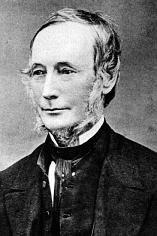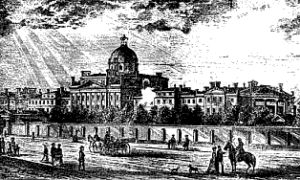
Dr. Joseph Workman (May 26, 1805-April 15, 1894), known as the “Father of Canadian Psychiatry,” was in 1845 the principal founder of the First Unitarian Congregation of Toronto. He largely wrote the church’s constitution which affirms “the free exercise of private judgment in all matters of belief” and provides that “females” were to “exercise the same privileges as. . . males.” Workman was First Toronto’s first lay preacher, for its first ten years a Board member, and a key raiser of building funds. In 1854 he wrote, “The church has ever been among the objects dearest to my heart; and as long as God spares me life and health I trust never to forsake it in whatsoever trial.” All his life he and his wife, Elizabeth Wasnidge Workman, called themselves and were well known as Unitarians.
Joseph’s brother Benjamin had earlier helped found the Montreal Unitarian Church. Another brother tried unsuccessfully to establish a Unitarian church in Ottawa. Two, also Unitarian, served as mayors, in Montreal and Ottawa, and one founded the Sun Life Insurance Co. The Workman family had come to Canada from Ireland where they were members of the Presbyterian church at Dunmurry, Co. Antrim where the leading Arian Henry Montgomery was minister. In 1829, the year Joseph emigrated, the minister and congregation signed a Remonstrance, refusing to subscribe to the Westminster Confession, and withdrew from the General Synod of Ulster. The churches of the Remonstrant Synod (now part of the Non-Subscribing Presbyterian Church of Ireland) were to develop close associations with the British Unitarian movement.
Workman taught high school while he studied medicine at McGill University. After his graduation in 1835 he was for ten years a hardware merchant in Toronto. From 1846-53 he practiced family medicine and taught at Dr. Rolph’s School of Medicine in Toronto. During this period he served as City Alderman, helped to establish a Hospital for poor immigrants, guided a Royal Commission which established the University College, Canada’s first secular college, and served as the first Chair of the Board of Education. Workman fought for free, non-sectarian, yet Christian education, which in his view should not include any imposed ritual, such as daily recitations of the Lord’s Prayer. He wrote, “The first step in any educational process is to inculcate in the mind of youth the great principles of honesty, truth, benevolence, loyalty to just authority and withstanding of tyranny and oppression of any sort. Next is to be placed the acquirement of that knowledge necessary to our immediate comforts and interests; and after that, accomplishments and refinements.” He said that the exclusion of women “from the study of the more profound branches of literature and science” savored of “barbarism,” though women should, of course, not neglect the study of “plum pudding,” “the darning needle [and] the smoothing iron.”
A social reformer, Workman advocated publicly financed aid for the poor, extension of the franchise, and women’s rights. In his many articles he showed concern for poverty, poor health care, alcoholism, and especially fetal alcohol syndrome and infant mortality. Working as a forensic expert, he denounced capital punishment.

Religiously, Workman stressed “God’s powers of pardon.” Out of concern for unstable people, Workman railed against “fulminating orators,” revivalism and epidemics of what he called “religious commotion” which brought on, in vulnerable people, the “religious-emotional” type of insanity. He described the judgemental clergy of the established churches as better “hookers of money” than “fishers of men,” who needed “to be shown what Christianity is, the way Christ preached it.”
Workman served by appointment as Superintendent of the Provincial Lunatic Asylum (1853-75). He advocated kindness to the mentally ill and sought in them “that spark of humanity which dwells in each of us.” Workman fought to end asylum staffing systems based on political patronage, promoted healthier living conditions for asylum inmates, and initiated an internship program for future psychiatrists. His establishment of the framework of asylum management in Canada brought many international speaking engagements and honours.
For his pioneering and educational work Workman was called the “Nestor of students of mental disease.” Reflecting in one of his diaries Workman wrote, “One can ask why the Deity, when he made man, chose not to make him whole. One can understand why He chose against perfection, for what glory is there in praise from the perfect, who are incapable of choosing not to praise. Yet to make man with so fragile a thing as the human mind is, to me, incomprehensible.”
Sources
Correspondence of Joseph Workman is preserved in the Province of Ontario Archives, Toronto; the Clarke Institute Archives, Toronto; the Queen Street Mental Health Centre Archives, Toronto; the Harvard Medical Library, Boston; and the Academy of Medicine Collection, Thomas Fisher Rare Book Library, at the University of Toronto Library. His journals and other unpublished works can be found at the latter site, in the University of Toronto Archives, at the Library of Environment Canada in Toronto, and in the Griffin-Greenland Collection, Queen Street Mental Health Centre Archives, Toronto. Workman’s reports on the asylum are in Journals of the Legislative Assembly of the Province of Canada (Ontario Archives). Many of his articles can be found in the Journal of Insanity, Alienist and Neurologist, Canada Lancet, and the Canadian Medical Journal. The only biography is Christine I. M. Johnston, The Father of Canadian Psychiatry: Joseph Workman (2000).
Article by Christine Johnston
Posted January 27, 2014